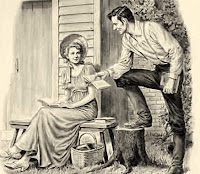 As far as I have been able to find out, there are no known photographs of Ann herself. But whenever I see her name, I immediatly am brought to mind of an illustration in a children's book I read in 2nd grade - The Life of Abraham Lincoln - in which Ann is sitting outside, wearing a blue dress and bonnet, with curly dark hair and and a grin on her face. This will probably be the way I will always picture Ann Rutledge. Her story, on the other hand, is much more vague. In fact, no one really knows exactly what happened between her and Abraham Lincoln.
As far as I have been able to find out, there are no known photographs of Ann herself. But whenever I see her name, I immediatly am brought to mind of an illustration in a children's book I read in 2nd grade - The Life of Abraham Lincoln - in which Ann is sitting outside, wearing a blue dress and bonnet, with curly dark hair and and a grin on her face. This will probably be the way I will always picture Ann Rutledge. Her story, on the other hand, is much more vague. In fact, no one really knows exactly what happened between her and Abraham Lincoln.As a bare minimum, Wikipedia states that Ann was born on January 17, 1813, near Henderson, Kentucky - the third of ten children born to Mary and James Rutledge. The story is that Rutledge was engaged to John MacNamar, a dubious character who left for New York and promised to marry her upon his return. Rutledge and Lincoln supposedly fell in love while he was gone and she promised to marry him after MacNamar released her. For a time Rutledge and MacNamar exchanged letters, but his letters became more formal and "less ardent in turn" and eventually ceased completely. MacNamar never returned before her death. In 1835, a wave of typhoid hit the town of New Salem, leading to Rutledge's early death. This sad event left Lincoln severely depressed. Historian John Y. Simon reviewed the historiography of the subject and concluded, "Available evidence overwhelmingly indicates that Lincoln so loved Ann that her death plunged him into severe depression."An anonymous poem about suicide published locally exactly three years after her death is widely attributed to Lincoln. After Lincoln's assassination in 1865, his friend and law partner William Herndon first revealed the story of the supposed romance between Rutledge and Lincoln, much to Mary Todd Lincoln's anger and dismay. Abraham Lincoln's surviving son Robert Todd Lincoln was also upset by this claim. Most of Herndon's sources came from interviews with Lincoln's early friends in New Salem and Ann's relatives. The story was later repeated by Herndon in several lectures and books.

The exact nature of the Lincoln-Rutledge relationship has been fiercely debated by historians and non-historians for over a century. Evidence is skeptical at best. As for my own romantic self, I like to beleive that Lincoln really did love Ann, and that at least at some point in his life, no matter how short-lived, that there was a woman who completed him and brought him joy.
If anyone else is remotely interested in this doomed love affair, here are a few books I have put on hold at the library. I haven't read them yet but hopefully they will shed a little more light on the subject:
The Shadows Rise: The Abraham Lincoln and Ann Rutledge legend, by John Evangelist Walsh
The Women in Lincoln's Life, by Donald H. Winkler
The Intimate World of Abraham Lincoln, by A. C. Tripp
No comments:
Post a Comment